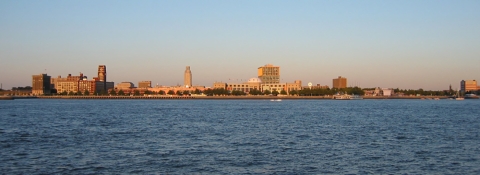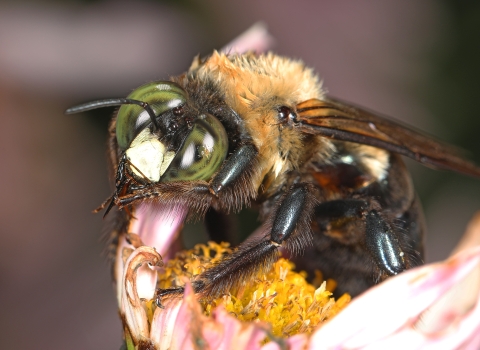More than ever before, the need for access to natural areas is at the forefront of people’s minds — particularly in densely populated areas where urban sprawl limits residents’ access to green spaces to gather and recreate in nature.
In Camden, New Jersey, where an urban community stricken by poverty and pollution is in dire need of a way to connect to nature, a new recreational water trail will offer the chance to do just that.
Industrial Lifeline
Coursing through the city of Camden are the Cooper and Delaware Rivers. For centuries, the waterways were the industrial lifeline for the area. Manufacturers such as New York Shipbuilding Corporation and household name Campbell Soup Company brought thousands to Camden, seeking out the new and plentiful job opportunities.
In the mid-1900s, following World War II, numerous industries decentralized and moved operations from Camden. As they shut the doors, thousands were left without opportunities to support their livelihoods.
Camden became known for high poverty rates, high crime rates, and significant pollution of the once beautiful natural spaces and waterways.
Green Renaissance
Today, however, the city is undergoing what is being called the Camden Green Renaissance. Parks, waterfront access, and green spaces that have fallen into disrepair and have historically been unavailable to many of Camden’s low-income residents are being restored.
The Upstream Alliance is playing a major part in the revitalization of the city. The group recognized the dire need of Camden's underserved communities to have access to natural spaces and the waterfront for both recreational and educational use. Alliance members include the Camden County Parks Department, the Center for Aquatic Sciences at Adventure Aquarium, Cooper’s Ferry Partnership, New Jersey Conservation Foundation, and the Academy of Natural Sciences of Drexel University.
The Upstream Alliance plans to open the Camden Water Trail to provide river access to the underserved communities living in the commonly underserved neighborhoods in the heart of Camden. The 13-mile trail will run along the Delaware River Back Channel and down the Cooper River. The project is partially supported by the Delaware Watershed Conservation Fund.
The Delaware Watershed Conservation Fund was launched by the U.S. Fish and Wildlife Service and National Fish and Wildlife Foundation in 2018. It supports efforts to conserve and restore natural areas, corridors and waterways on public and private lands that support native fish, wildlife and plants, and to contribute to the vitality of the communities in the Delaware River watershed. The grant program strives to fund projects like the Camden Water Trail that improve access for historically underserved communities.
Ivana Quinones, an environmental educator for Camden County Schools and a Camden native, recounts growing up in Camden unaware that Cooper River was practically in her backyard. In her current position, Quinones formulates curriculum and programming to educate students and adults alike about the wealth they hold in the waterway so close to their neighborhoods.
“Having access to natural spaces is such a vital educational and social resource,” Quinones explains. “However, in Camden, the river has such a terrible reputation of being polluted and unsafe. That’s why it is crucial that this programming and information gets out there and explains the awesome restoration that has brought the rivers back to us. It is safe for kayaking and paddling trips and is an amazing learning tool.”
Along with providing prime waterfront access for human populations, the project strives to improve conditions for key wildlife species living in the Cooper River. Migratory American shad and river herring are facing challenges in reaching their spawning grounds due to dams along the Cooper River. A key to opening the 13-mile, continuous water trail is constructing fish and boat passageways along the Kaighn Avenue Dam, allowing paddlers to continue nearly four miles and fish to reach five miles of spawning habitat.
The Camden Water Trail made its public debut on December 6, 2021, with the grand opening of the Cramer Hill Waterfront Park. The park stands on the former site of the Harrison Avenue Municipal Landfill, which has been closed for 50 years yet was still a common site for illegal dumping. The opening of the park signals the onset of Phase II of the project, as well as the revitalization of the connection between the people of Camden and their waterways. The 13-mile water trail is proposed to be fully installed by 2023. View the proposed map of the Camden Water Trail
A century ago, Camden’s rivers served the city’s residents by powering factories that provided jobs. Times have changed, and so has the city's connection to the rivers. When the Camden Water Trail is complete, the city’s rivers will be a much-needed source of respite for this century’s urban dwellers.





